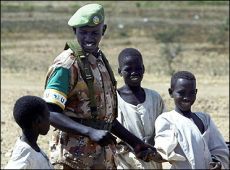UN: Sudanese forces pressure Darfur refugees to return home against their will
UNITED NATIONS, Nov 2 (AFP) — A high UN official accused Sudanese government forces of pressuring Darfur refugees to return to their villages or to relocate against their will.

|
|
A Rwandan soldier operating under the Africa Union mandate plays with children outside the AU base in Kab Kabiya, north west of El-Fasher, Sudan. |
“We’ve had difficult discussions during the last couple of weeks on the implementation of our agreement with the government with regard to the non-voluntary returns,” said Jan Pronk, UN Secretary General Kofi Annan’s special representative for Darfur.
“Despite the agreement, there was continuous pressure” on the refugees to return or relocate, he told reporters.
“The government has told the (internally displaced persons) that it was happening in close consultation with the United Nations and with nongovernmental organizations, which is not the case,” said Pronk.
“This is in flagrant violation of international humanitarian law and of the agreements reached with the government on the modalities of return and relocation of (the displaced people).”
As an example, Pronk cited the recent forced displacement, in the middle of the night, of some 2,000 refugees from the El Geer refugee camp to the Sherif camp near Nyala in southern Darfur.
“It has to stop,” he said, “not only in El Geer but as a policy, and the people have to be brought back to the place where they were forced away from.”
Pronk said the forced movement of refugees from El Geer had stopped, “not because of the government stopping its policy but because of protest by the IDPs. They started to protest, throwing stones and I’m very concerned that a situation like this might explode.”
Asked whether the general security situation in Darfur had deteriorated recently, Pronk replied, “Yes.”
The Darfur province, in western Sudan, has been torn since February 2003 by a civil war that has left some 70,000 dead and engendered what the United Nations calls the world’s worst humanitarian crisis, with some 1.5 million people forced from their homes.
